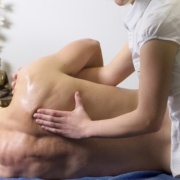How Massage Helps Anxiety
Many of us are familiar with the calming effects of massage therapy. Massage treatments, though, can be many different things. One approach and technique may be great for one person and torture for another. So as I attempt to offer insight into how massage can help alleviate the effects of anxiety, I will address several approaches and how they affect different symptoms associated with anxiety.
The standard circulatory or Swedish massage is amazing for increasing circulation and encouraging the release of endorphins. The effects are very similar to those you experience after exercise, with these hormones giving the body an exhilarating sense of well-being.
Sometimes, if we’ve been stuck in a state of anxiety for long periods, it can begin to affect our posture. Our shoulders hike up and round forward, our head becomes forward, and general tension builds up other places, as well. A fast or vigorous massage may be over-stimulating and won’t correct the long-standing posture issue. Instead, focusing on muscles that hold us in that posture with a slow sustained manner can allow our body to move toward a more neutral posture without being over-stimulating or agitating.
The last modality I’ll cover here, even though there are many others that have positive impacts on anxiety symptoms, is Lymphatic Drainage. This technique is my personal favorite for those who are really locked in that state of overwhelm and worry. Lymphatic drainage for the head, neck and face, in particular, put even the most high-strung person right to sleep. Pressure is light and rhythmic and because of that, the progression of movement can be easily anticipated by the client so the need for the body to guard itself absolves completely.
All of our therapists are trained to be able to meet our clients where they’re at when they land on our tables. While not all of our therapists are trained in every technique, each technique is adaptable to be able to meet clients needs. We love to hear from our clients and help them decide what will work best. And if our front desk can’t answer your specific question, we can have a therapist call you back.
Be well and we hope to see you soon.
Yours in health, Gina Tibbs



